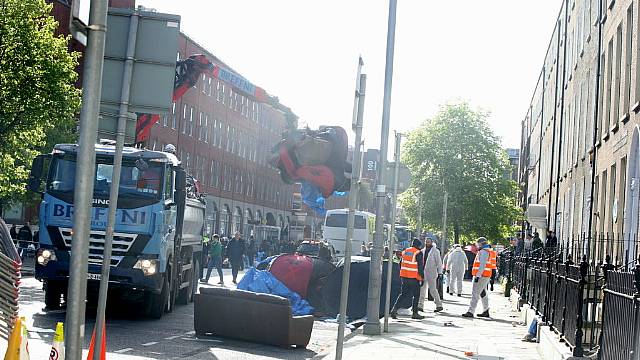Minister for Integration Roderic O’Gorman has described the intensive work across government agencies to clear international protection applicants living in tents on Mount Street.
“This morning, officials from my department made offers of accommodation to those who are camped at Mount Street. They've been bused to international protection accommodation locations around Dublin. And subsequently then the street was cleared by Dublin City Council. And all of this was done with the support of the gardaí.
"I know this has been an extremely difficult situation for the applicants themselves, for the local residents, for the businesses on that street. But because of the additional accommodation that was opened up over the last number of days, we were in this position to make offers and to accommodate all those who had previously been sleeping rough at Mount Street,” he told RTÉ radio’s News at One.
Mr O’Gorman further explained that the people who were moved will now be accommodated in large eight-person tents in Crooksling.
Meals will be provided along with shower facilities, while some others will be moved to City West.
“Using state provided accommodation for international protection applicants is not mandatory. People have the option to not take it up. But certainly my understanding is that everyone who was offered the accommodation today, took up that offer and has travelled to either Crooksling or the accommodation in City West.”
Mr O’Gorman pointed out that his department has an obligation to offer accommodation to international protection applicants, but they were not in a position to offer a choice of accommodation.
The people who had been sleeping rough in Mount Street were offered accommodation in Crooksling or City West, and he hoped that they would take up the offer.
The department had been “under very significant pressure” and had seen the number of arrivals increase in recent weeks.
“It is important that my department can continue to bring on additional accommodation, both for families but also for male applicants as well. At the end of March we published the Comprehensive Accommodation Strategy, which sets out steps to deal with the kind of immediate challenges we face in terms of being able to bring on more basic levels of accommodation quickly.
"But secondly, wants us to move away from a system where we're so dependent on commercial providers and provide a core of 14,000 state owned beds, going forward so the state has much more control over the location and the costs of international protection.
“The most immediate, the most practical way that we can avoid situations where people are sleeping rough, is that we can bring on more sites like these, where we can rapidly provide that that basic level of accommodation.”







